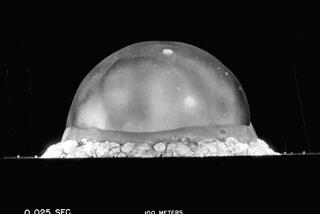In the Great Cosmic Scheme of Things . . .
- Share via
In wondering the other day about why we are here (a subject plainly beyond my philosophical reach), I suggested that if God is infallible--as many of us believe--why did he do such a bad job of it when he created humankind?
Why, I asked, did he create two sexes, and leave the procreation of the species to sexual union, an arrangement that causes all kinds of trouble. I have received several letters scoffing at this question, some suggesting that I myself must have enjoyed that arrangement.
“You dangerously strolled into Abby’s and Ann’s domain this morning,” writes Michele Yepiz.
“Sexual union is, to my mind,” writes Frank Wentink, “although I have been unable to indulge for some years because of the infirmities of old age, still remembered as the most glorious of all sensations when indulged in by two persons who love each other.
“Obviously,” he concedes, “even people who don’t love each other must find it so, judging from the large number of illegitimate children being born in these times. After reading your column for many years it is difficult for me to imagine you never enjoyed sex.”
Perish the thought. That is the trouble with sweeping philosophical statements.
Yet that is exactly my point. If sex were not so enjoyable, it would not be so widely practiced, and the world would not be moving toward a dreadful population explosion.
The Earth’s population today is increasing at the rate of three persons per second, or about a quarter of a million every day. That will be an increase of one billion by the year 2000. Where are we going to put us?
Supposing God had arranged that men and women did not produce children by having sex, but by washing the dishes together? Surely that would cut down considerably on the birth rate.
Of course, we didn’t have dishes until the species was several thousand years old, but surely God could have found some other, less enjoyable way to procreate.
Let me leave the question of why we are here for a moment to consider three other questions of cosmic consequence reported by the press in the past week.
First, astronomers have discovered that the universe is only about half as old as many of the oldest stars and galaxies it contains. That is a paradox. We have always thought the universe included everything. Every last particle. How can it be younger that some of its parts?
I’ll leave that one to the astronomers.
The second startling news story was about the discovery of the missing link. For decades, scientists have been searching for the bones of a creature that links human beings and the apes.
Now they think they have found it in Ethiopia. It is only a handful of teeth and skull fragments, but they are about a million years older than any other bones found in the human family tree.
“This species,” says Tim D. White, a paleontologist, “is the oldest known link in the evolutionary chain that connected us to the common ancestor (we share) with the living African apes.”
Creationists who doubt Darwinian theory have always thrown “the missing link” at scientists who insist evolution is not theory, but fact. “Where’s the missing link?” they’d say. Now, evidently, we have it.
The third news story, in the New York Times, is rather more disturbing.
About a billion years from now, it says, the sun’s increasing brightness may evaporate Earth’s water.
Then, on its way to becoming a red star, the sun will burn its various gases, with periodic explosions. Finally, some 12.4 billion years after its birth, it will undergo the last of its spasmodic helium explosions. The dying sun will form “a planetary nebula, a small hot stellar remnant.”
“Further cooling will leave the sun as a white dwarf,” the article says, “consisting of matter so dense that one cubic inch would weigh about 10 tons. At the end of the trail the sun will become a black dwarf orbited by the cinders of its former planetary system, including the frozen remnant of the long lifeless Earth. There Earth will continue to spin, perhaps forever.”
I was discussing these matters at lunch with Herb Henrikson, a Caltech scientist, and asked him what he thought about the inevitable end.
He said he was reminded of the story about the little old lady who was informed that all these dreadful things would happen in 12 billion years.
“Oh dear!” she exclaimed. “In only 12 million years!”
“Twelve billion years, not million,” she was informed.
“Thank God!” she said.
As one of the scientists quoted by the New York Times said: “Fortunately we still have lots and lots of time.”
To do what?
* Jack Smith’s column is published Mondays.






